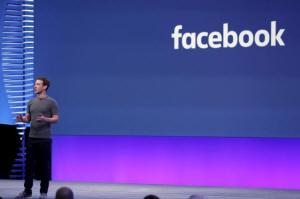|
Facebook's Zuckerberg meets U.S.
conservatives over bias controversy
 Send a link to a friend
Send a link to a friend
[May 19, 2016]
By Lisa Richwine and Dustin Volz
(Reuters) - Facebook Chief Executive Mark
Zuckerberg heard from more than a dozen U.S. conservative leaders on
Wednesday and said he will work to build trust with users who believe
the social network displays politically biased news content.
|

Facebook CEO Mark Zuckerberg speaks on stage during the Facebook F8
conference in San Francisco, California April 12, 2016. REUTERS/Stephen
Lam |
|
 After a closed-door meeting at the company's Silicon Valley
headquarters, Zuckerberg defended his company's practices but
acknowledged that many conservatives believe Facebook is politically
liberal. After a closed-door meeting at the company's Silicon Valley
headquarters, Zuckerberg defended his company's practices but
acknowledged that many conservatives believe Facebook is politically
liberal.
"It doesn't make sense for our mission or our business to suppress
political content," Zuckerberg wrote on Facebook after the meeting.
"I know many conservatives don't trust that our platform surfaces
content without a political bias," he added. "I wanted to hear their
concerns personally and have an open conversation about how we can
build trust. "
The editorial practices at the world's largest social network came
under scrutiny after a former Facebook contractor anonymously
accused editors there of deliberately suppressing conservative news.
The allegations were reported by technology news website Gizmodo,
which did not identify the ex-contractor.
Facebook has denied the allegations and said it would conduct a full
investigation.
 A Facebook spokeswoman said the meeting produced "a constructive
discussion" and some attendees called it productive.
"I think Facebook is very sincere in wanting to resolve outstanding
issues with conservatives," Brent Bozell, president of the Media
Research Center, said after the meeting.
Attendees were frank about their concerns, but the tone was cordial,
Bozell said. "Facebook invited that frank talk. People didn't hold
back too much," he said.
On her Facebook page, conservative CNN commentator S.E. Cupp said
the meeting had produced "strong commitments to address issues, as
well as to work together on common goals."
Other attendees included former White House press secretary Dana
Perino, media personality Glenn Beck and former Republican Senator
Jim DeMint.
Zuckerberg said that while Silicon Valley has a reputation for being
liberal, Facebook's 1.6 billion users span every background and
ideology.
"The reality is, conservatives and Republicans have always been an
important part of Facebook," Zuckerberg wrote.
Presumptive Republican nominee Donald Trump has more Facebook fans
than any other presidential candidate, he said. Fox News "drives
more interactions on its Facebook page than any other news outlet in
the world," Zuckerberg added. "It's not even close."
Fox News is owned by Rupert Murdoch's 21st Century Fox <FOXA.O>.

[to top of second column] |

Facebook employees who donate to presidential candidates lean
Democratic. Seventy-nine percent of employee contributions to 2016
contenders went to Democrats, according to a Reuters analysis of
campaign finance data, and 21 percent to Republicans.
Zuckerberg has contributed to candidates in both parties.
Sixty-percent of his donations during the 2014 midterm elections
went to Republicans and 40 percent to Democrats. He has not
supported a presidential candidate this cycle.
Although a U.S. Senate committee is investigating whether there is
liberal bias in selection of trending topics, there is little chance
the government will try to regulate Facebook's practices, said
Republican Senator John Thune, chairman of the Senate Commerce
Committee.
"I don't have any reason to believe that would be necessary," Thune
told reporters on Tuesday.
Thune sent a letter to Facebook last week to demand that it explain
its editorial decision-making and how stories are chosen for the
"trending topics" feature. He said his primary concern was that
Facebook was potentially being deceptive about how its news feed
curation algorithms work.
Facebook last week released its guidelines for choosing trending
topics, but the operations of the news feed algorithm remain closely
guarded.
Legal experts said the government has few tools to dictate how a
private company makes news decisions.

"As a legal matter, Facebook is not required to be even-handed,"
said Eugene Volokh, a law professor at the University of California,
Los Angeles. "Congress can't introduce something that tries to
prohibit Facebook from making these kinds of choices."
(Reporting by Yasmeen Abutaleb and Dustin Volz; Editing by Jonathan
Weber and Tom Brown)
[© 2016 Thomson Reuters. All rights
reserved.]
Copyright 2016 Reuters. All rights reserved. This material may not be published,
broadcast, rewritten or redistributed. |